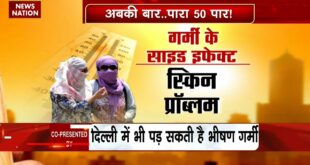[ad_1]

Letter from Bhopal: Facing COVID-19, Citizens Spread Masks, Food and Hope
On March 24, facing the perilous COVID-19 pandemic, Prime Minister Narendra Modi of India abruptly imposed what amounted to a 21-day lockdown of a nation of 1.3 billion. Some 250 million of those people live on less than $2 a day, many with no secure home in which to practice social distancing, no nearby access to safe water or sanitation facilities.
The result was a mass movement of people that the veteran epidemic-focused health reporter Laurie Garrett this week said almost assuredly accomplished the opposite of what the government hoped for -— widely dispersing the highly contagious virus. “This undoubtedly spread COVID and has made it a national phenomenon in India,” she said in a video conversation on the Earth Institute’s Sustain What webcast.
The reality will emerge in the days to come, as testing and symptoms spread. But the impacts go far beyond the threat to health. Recent news reports show the threat of hunger is rising among the country’s poorest families and itinerant workers who can’t get their government cash payments or keep jobs.
At the same time, stories are also emerging of innovative community-led efforts to help front-line workers stay safe and provide food for the most vulnerable citizens with the least capacity to avoid the illness.
Below you can read one such story, sent by Pooja Iyengar, a video editor, filmmaker and social and environmental activist in Bhopal, the capital of the central Indian state of Madhya Pradesh. (Pooja’s sister, Radhika Iyengar, is a familiar presence on State of the Planet and a research scholar at the Center for Sustainable Development.)
On Monday at 9:00 a.m. EDT, 6:30 p.m. in India, you can join a live Sustain What video conversation with Pooja and several colleagues who are coordinating teams of women sewing masks for front-line city workers and part of a network cooking and distributing thousands of meals and packets of dry food goods to those most in need.
Watch and offer questions or comments on Facebook Live and YouTube as well as by subscribing to my video feed on Periscope. You can also follow along below:
Here’s Pooja Iyengar’s dispatch describing how the project evolved and works:
Bhopal was under lockdown as we wanted to avoid the spread of COVID-19. The street looked empty. Everyone who had the means to stay indoors followed orders. However if you really looked hard, there were people who were left stranded, homeless. There were construction contractors who left their daily-wage jobs with no work and no food. They lived in tin sheds temporarily built at construction sites.
Many municipal officials also could not stay home. Traffic police, trash and recycling collectors and many others have to be in the streets. At health facilities, doctors and nurses have to do their duty in the time of crises.
It was clear that our city, Bhopal, needed help.
Our city needed us, but we didn’t know how to help. We could see hungry kids, people in the corners of the city, but how should we reach out and help when a curfew is on? This was the challenge posed to us as Bhopal residents.
Under the name of “Swachhata Ambassadors” — “Cleanliness Ambassadors” — we had already been helping the Municipal Corporation of Bhopal spread the message of “reduce, reuse and recycle” around plastics. But with the current pandemic crisis, there were urgent needs that needed to be addressed right away.
We started by understanding our own strengths as a collective. We quickly organized into a large group using WhatsApp. It was easy to convince everyone of the need. The question was how should we help the marginalized and the city government?
My colleagues are Mita Wadhwa, who works in telecommunications and runs her own company; Gurvinder Singh Saluja, an accountant; Sparsh Dwivedi, a head trainer for a life insurance company. I am a professional video editor and run my own social enterprise, Mahashakti Seva Kendra (Yes, I am the Change). Here is a short film I made about that project.
We are from different fields but bound together by our love for our city and its people. Before the pandemic, we were all working together to make our city plastic-free.
In normal times, the Mahashakti organization makes beautiful women’s dresses that are exported to the United States, Belgium and other international destinations. Now the employees are sewing masks from home for the workers in essential services.
Gurvinder Saluja took it upon himself to start and manage four community kitchens in the city and with the contributions of the citizens and the administration, the kitchen churns out nearly 8,000 food packets a day to feed the poorest. His daily goal is that no one will sleep hungry in his city.
Sparsh Dwivedi spearheads a very influential group called Dream Bhopal, Green Bhopal. He has focused on raising donations allowing us to stock up the food we give to the marginalized and people in greatest need. Sparsh also helps in coordinating where there is a need for food packets.
Mita Wadhwa is on the front lines, usually out from 10 a.m., coordinating at the local Gurudwara (a place of prayer for the Sikh community), which is also making food packets for the needy. WhatsApp helps us constantly gauge pockets of greatest demand for cooked or dry food.
On a typical day, we get a call from a community member in a part of the city who tells us that he has seen a few stranded families. Mita then gets the required food packets from the Gurudwara, meets the intermediary and gets the food to the families in need.
We are constantly adapting and growing — and all of this in a city under lockdown. We have special passes that allow us to move, with full instructions on maintaining six feet of distance in our operations and ensuring that we wear masks and gloves all the time.
On Thursday, we celebrated a “touch-free Ashtami” festival (to pray to the Goddess Durga). In normal circumstances, families invite the female children of neighbors to give them a special meal or “Prasad.”
However this one was special, the first of its kind, where the special meal was made in the Gurudwara and taken to the little girls in the slums who most needed food.
With the lockdown, the girls could not visit houses for the feast. So 150 citizens took the Prasad to the informal settlements. This news spread to Texas and even New Jersey, resulting in more financial support for the effort.
We continue to run the community kitchen at the Gurudwara. Someone peels the ginger, someone makes the rotis, the other stirs the lentil soup. The rule of the Gurudwara is that the person who picks up the food packet needs to do some “kar seva” or service, so today it was my duty to help out. I opted to peel ginger and love the smell of it.
There are 150 of us making Bhopal Clean and Green, and also coming together to make Bhopal COVID-19 free.
Hopefully our experience can help you plan projects to help sustain your community, wherever you live.
Source link
Y Not Freakin’ Recyclable Home
 Pollution Climate Change Holocene Deforestation Population Acidification Y Not Freakin' Recyclable
Pollution Climate Change Holocene Deforestation Population Acidification Y Not Freakin' Recyclable



